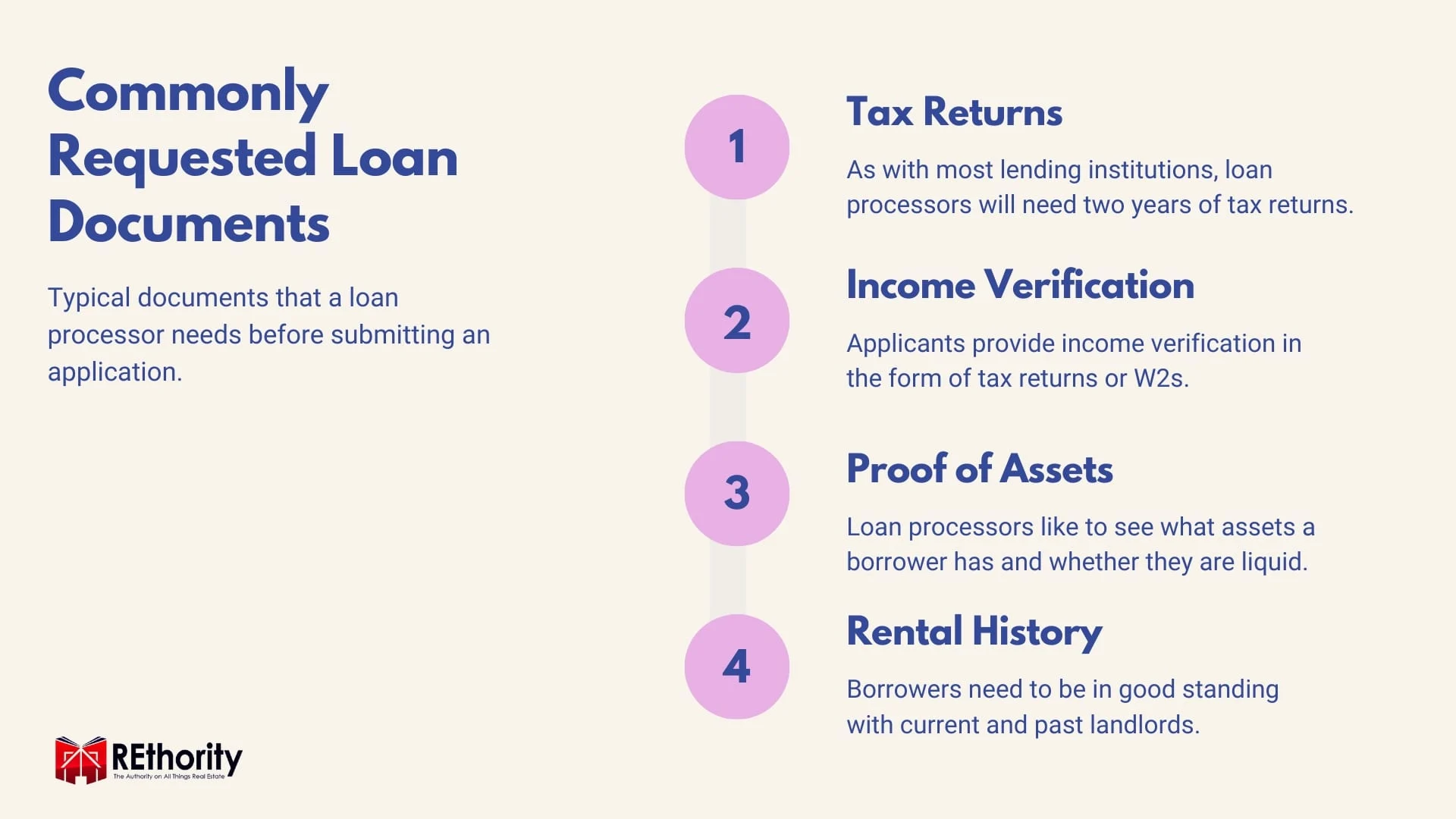If you’ve ever been pre-approved for a mortgage or gotten a loan, you’ve worked with a loan processor, even if you didn’t realize it.
A loan processor is your liaison between the person who decides whether or not you’ll be approved – the underwriter – and your loan officer.
You might hear loan processors referred to as loan interviewers or loan clerks. This gives you a better idea of what the role consists of – interviewing and processing documentation as part of the loan application process.
What Is a Loan Processor?
While there may be a few different titles, these three roles have the same duties and requirements. A loan processor has primarily an administrative role, one that is not technically part of the loan approval process.
A loan processor’s job involves a wide range of administrative duties, and many of them center around tasks like ensuring your lender has all the necessary documents, forms, and reports to verify your financial background.

All of this information is then used by the underwriter to determine whether or not you qualify for a loan. Maybe you want to gain a better understanding of the role of a loan processor to prepare yourself for the loan application process.
Or maybe you are considering making it your career. Either way, we’ll walk you through the role and its duties, salary averages, job requirements, and where loan processors are typically employed.
Let’s start by looking at the duties a loan processor is responsible for on the job.
Loan Processor Duties
According to The National Association of Mortgage Processors:
The primary function of the Loan Processor is to ensure the timely and accurate packaging of all loans originated by loan officers.
A loan processor is the person who receives the application from your loan officer, packages it with all your financial documentation, and submits it to the loan underwriter for approval.
If any information is missing, you’ll usually hear about it from your loan processor and not the underwriter. Some of the information a loan processor needs to pass along to the underwriter won’t come directly from you.
They might independently pull your credit reports, order inspections and appraisals, and verify the documents and information you’ve already provided.
Now that you see what the general role of a loan processor consists of, what are a loan processor’s specific duties and day-to-day tasks? Generally, the role of a loan processor involves:
- Interview or assess loan applicants
- Take in all documents submitted by the applicant
- Organize and package submitted documents
- Upload documentation to the lender’s secure computer system
- Request or independently verify your information and documents:
- Your identity, including photo ID, address, social security number
- Your credit score, including the income-to-debt ratio
- Your income and employment history
- Your monthly and annual expenses
- Your cash and investment assets
- Your ability to pay a down payment
But don’t think this is where the duties stop. Not only do loan processors collect and organize all of the loan documents, but they also order and organize various third-party requirements.
- Order additional information, like an inspection or appraisal if you’re applying for a mortgage
- Continually make sure your application and processing meets all regulatory and internal requirements
- Order the finalized loan documents
- Work with you to schedule a closing appointment with your loan officer
- Liaise with you from pre-approval through closing
The loan processor makes sure your application can be processed smoothly by carefully checking every part of the process. They ensure you have the best chance at approval by being the manager of the documentation side of your application.
By verifying your income, credit reports, and assets, the loan processor makes sure you are in a financial position to support a monthly mortgage or loan payment.
If you make enough income but have a large amount of debt, the loan processor will see that you have trouble managing debt, and this will affect whether or not the underwriter approves you.
Working with a Loan Processor
While most loan applications are processed smoothly, it’s not uncommon for loan applicants to have a bit of a difficult time working with their loan processor. This is especially true if it’s a challenge for the applicant to come up with the correct documentation.
Loan processors have to request additional documentation that may not be readily available for an applicant, like bank statements from several months ago or past years’ tax documents.
The best way to help your loan processor ensure your loan application moves ahead quickly and without difficulty is to try to have the correct documentation handy before you even start the application process.

This information includes:
- Tax returns
- At least last year’s return, but try to have at least the two most recent years. The more documentation, the better!
- 1-2 months of paystubs
- W2s or other proof of income
- Bank statements for the last year
- Proof of any assets you own
- Including any investments you may have
- Proof of down payment
- It’s best if you’ve had the cash in your account for a while – lenders don’t want to see it pop up from a one-time influx of cash. This could mean it will be difficult for you to make payments on the loan once that cash is gone.
- Credit history
- Your lender will do a credit check, but if there are any problems with your credit report, any additional documentation you can provide helps.
- Gift letters
- These are letters stating someone gave you money as a gift and not a loan. You only need this if you’ve been given cash to cover the down payment or future mortgage payments.
- A government-issued photo ID
- This could be a driver’s license, passport, or another form of ID with your photo on it.
- Rental history
- Include the names, addresses, and phone numbers of past landlords so your lender can contact them to verify your rental history. Lenders will be looking for any evictions and want to see a history of on-time payments.
Applying for a large loan or mortgage puts your lender on the hook for a large amount of money. They need to be sure you’re in the financial position to pay it back over time.
Most mortgages are paid over about 30 years – that’s a substantial financial commitment. If there are any issues with your application, your loan processor will let you know what you need to do to correct them.
The loan processor’s involvement directly with you depends on the lender’s internal policies. Your loan processor might be one of your main points of contact, or they may work behind the scenes.
After all, their job is to verify and collect your information to pass along to the underwriter. Now, let’s look at the requirements a loan processor should meet and what makes them different from a loan officer or underwriter.
Loan Processor Job Requirements
Loan processors need to meet a few requirements before they can work in this role. These requirements include:
- A high school diploma or equivalency at minimum
- Associate’s degree may be required in some cases
- Attention to detail
- Data entry ability
- Ability to organize and collate complex documentation
- Knowledge of mortgage compliance rules and regulations
- Certifications may be required, including Certified Purple Processor (CPP), Certified Master Loan Processor (CMLP), or Certified Ambassador Loan Processor (CALP)
- Experience with accounting or business administration
- Loan processing, fraud detection, and policy training may be required
Overall, most of a loan processor’s training will be done on the job. If an employer does require certifications or education beyond a high school diploma, they may allow a new loan processor to complete the additional requirements over time.
The most basic requirements that must be met are a high school diploma and skills like attention to detail, organization, and data entry.
Remember, loan processors process information, so applicants with detail-oriented personalities will succeed.
Loan Processor Salaries
Loan processor salaries vary greatly depending on a few essential factors. Location, employer, education, and experience all play into the salary a loan processor can expect to earn.
Here is the latest average salary data for loan processors from a few sources:
- The Bureau of Labor Statistics reports an average salary of $41,960
- Payscale reports an average salary of $41,161
- Indeed reports an average salary of $45,316 per year, with earnings as low as $39,284 and up to $80,909 per year for a senior loan processor
The highest-paid loan processors are in Massachusetts, Connecticut, California, New Jersey, and Oregon.
Where Do Loan Processors Work?
Different types of lenders and companies that oversee lending hire loan processors to handle the applications and processing of mortgages and loans. Businesses and organizations that hire loan processors include:
- Real estate brokerages
- Banks
- Credit unions
- Mortgage banks
- Construction companies
- State governments
- Automobile dealers
- Legal services
The job outlook for loan processors is very good. By 2028, employment of loan processors is expected to grow by 9%, according to the Bureau of Labor Statistics.
So, What Does a Loan Processor Do?
Whether you’ll be working with a loan processor to get approved for a loan or are considering becoming a loan processor, it’s good to know what the role consists of, what the job requirements are, the average salary, and where loan processors are employed.
The loan processor is usually your point of contact, along with your loan officer, as an applicant. You can make sure your application is processed smoothly by having all the needed documentation ready and waiting when you’re asked to provide it.
A loan processor’s role is an essential part of any business that is involved in lending.
By organizing, collecting, and managing the documentation portion of a loan application, they ensure that the underwriter is making a sound decision in lending a large amount of money to an approved applicant.
Loan processors also ensure every applicant has the best chance of getting approved for a loan and can comfortably afford loan payments in the future.

